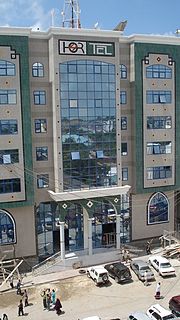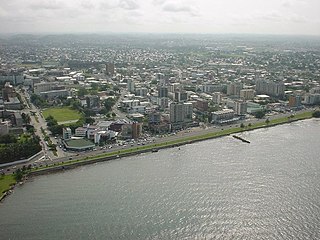Telecommunications in Burkina Faso include radio, television, fixed and mobile telephones, and the Internet.
Telecommunications in the Central African Republic includes radio, television, fixed and mobile telephones, and the Internet as well as the postal system.

Egypt has long been the cultural and informational centre of the Middle East and North Africa, and Cairo is the region's largest publishing and broadcasting centre.
Telecommunications in Gabon include radio, television, fixed and mobile telephones, and the Internet.

Telecommunications in Ghana include radio, television, fixed and mobile telephones, and the Internet.
Telecommunications in Lesotho include radio, television, print and online newspapers, fixed and mobile telephones, and the Internet.

Communications in Liberia include the press, radio, television, fixed and mobile telephones, and the Internet.
Telecommunications in Namibia include radio, television, fixed and mobile telephones, and the Internet.
Telecommunications in Niger include radio, television, fixed and mobile telephones, and the Internet.

Communications in Somalia encompasses the communications services and capacity of Somalia. Telecommunications, internet, radio, print, television and postal services in the nation are largely concentrated in the private sector. Several of the telecom firms have begun expanding their activities abroad. The federal government operates two official radio and television networks, which exist alongside a number of private and foreign stations. Print media in the country is also progressively giving way to news radio stations and online portals, as internet connectivity and access increases. In 2012, a National Communications Act was also approved by Cabinet members, and 2nd October, 2017, the president of Somalia Finally signed the National Communications Law, and became the official Law that regulated the ICT industry. Under that Law, National Communications Authority (NCA) of the federal Republic of Somalia has been established, with board of directors and a general manager.
Telecommunications in Tunisia includes telephones, radio, television, and the Internet. The Ministry of Communication Technologies, a cabinet-level governmental agency, is in charge of organizing the sector.
This article concerns the systems of telecommunication in Austria. Austria has a highly developed and efficient telephone network, and has a number of radio and television broadcast stations.
Telecommunications in the Gambia includes radio, television, fixed and mobile telephones, and the Internet.
Telecommunications in Angola include telephone, radio, television, and the Internet. The government controls all broadcast media with a nationwide reach.
Telecommunications in Ivory Coast include radio, television, fixed and mobile telephones, and the Internet.

Media in Burundi is controlled by the government.
Media of the Central Africa is controlled by the government.
Media in Chad is controlled by the government.
Media in Ivory Coast is controlled by the government. Audiovisual communications are regulated by the Conseil national de la communication audiovisuelle (CNCA), an administrative arm of the national government.
Media of the Republic of the Congo are severely restricted by many factors, including widespread illiteracy and economic underdevelopment.








